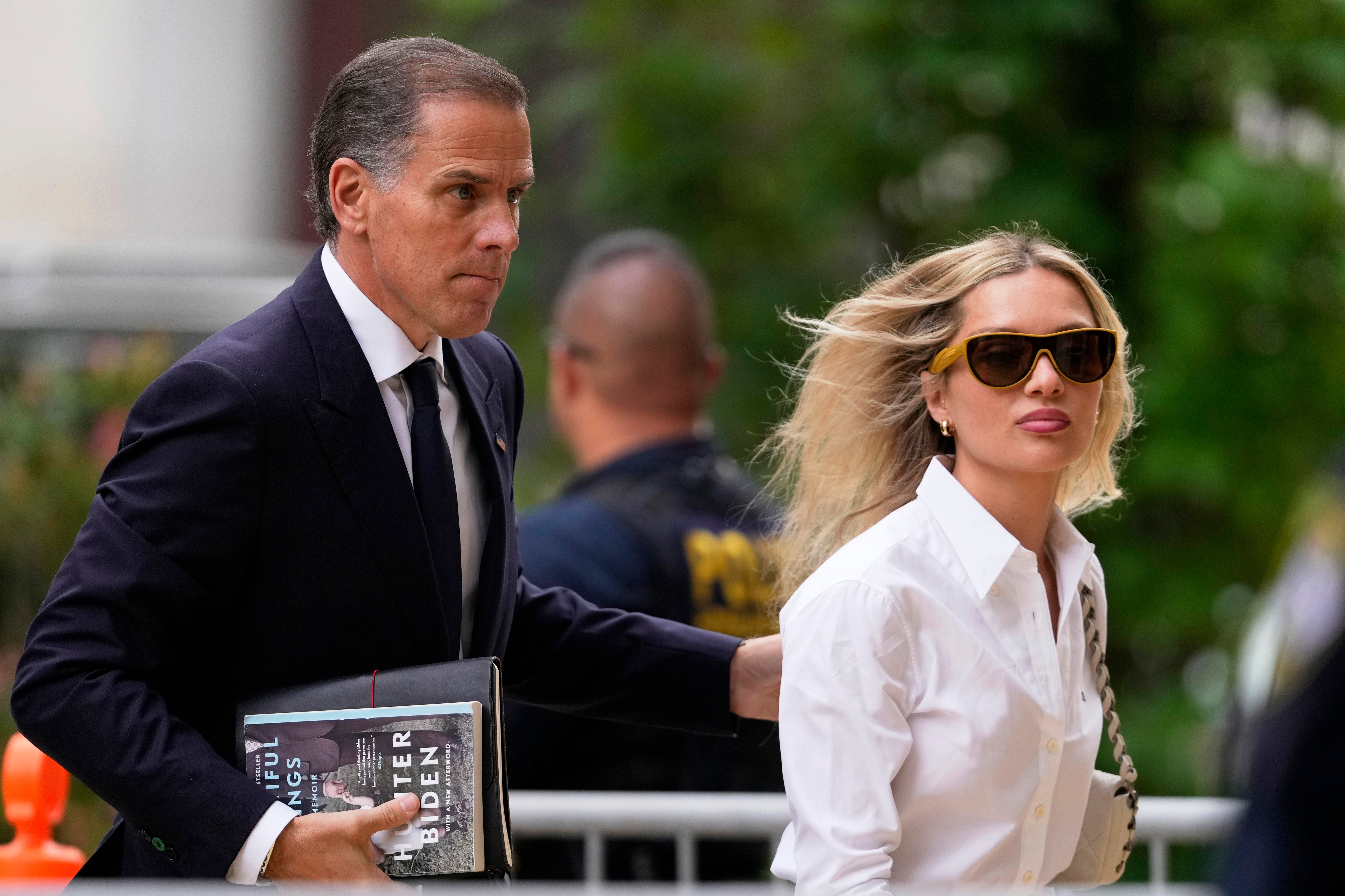The president’s son, Hunter Biden, has been found guilty in his federal gun trial in Wilmington, Delaware, after days of emotional testimony about the first son’s drug use.
After approximately three hours of deliberations, 12 jurors unanimously convicted him on all three felony gun charges, a historic decision that marks the first time a sitting president’s child has been found guilty of a crime.
“I am more grateful today for the love and support I experienced this last week from Melissa, my family, my friends, and my community than I am disappointed by the outcome,” Hunter said in a statement about an hour after the verdict was read. “Recovery is possible by the grace of God, and I am blessed to experience that gift one day at a time.”
He remained calm and still as the verdict was read, then turned to hug members of his legal team and kiss his wife, Melissa Cohen Biden. He left the courthouse holding hands with his stepmom, first lady Jill Biden, who missed the actual reading of the verdict. They all left the scene in a black SUV without issuing a statement.
“I will accept the outcome of this case and will continue to respect the judicial process as Hunter considers an appeal,” Joe Biden said in a statement. “Jill and I will always be there for Hunter and the rest of our family with our love and support.”
Special Counsel David Weiss said in a statement following the verdict: “No one in this country is above the law. Everyone must be accountable for their actions, even this defendant. However, Hunter Biden should be no more accountable than any other citizen convicted of this same conduct.”
He added: “This case was not just about addiction, a disease that haunts families across the United States, including Hunter Biden’s family. This case was about the illegal choices the defendant made while in the throes of addiction.”
Hunter was indicted in September after the plea deal he’d inked with prosecutors blew up over a federal judge’s concerns. At trial, jurors heard deeply personal evidence about the severity of his drug use, with prosecutors using his own texts and his memoir, Beautiful Things, in addition to the testimony of his exes, to accuse him of knowingly lying on a form to buy a gun on October 12, 2018.
Hunter could now face years behind bars. The charges carry a maximum sentence of 25 years in prison and fines of up to $750,000. But there is no minimum sentence, and non-violent first-time offenders usually do not receive severe punishments.
Hunter was accused of buying and owning a gun while being addicted to crack cocaine, flouting federal law, which states that those who use illicit drugs may not own firearms.
Prosecutors successfully argued that Hunter lied on a Bureau of Alcohol, Tobacco, Firearms and Explosives form when he purchased a 38 Colt Special revolver, a speedloader, and cartridges at the gun store in StarQuest Shooters and Survival Supply in Wilmington.

Hunter had the gun for 11 days before it was dumped in a trash can outside a grocery store by Hallie Biden, the widow of his brother Beau Biden, on October 23, 2018. Hallie and Hunter were in an on-and-off relationship at the time. Crack and alcohol were both “issues” during the relationship, Hallie testified.
She also spoke of her own drug use, which began after she was introduced to crack cocaine by Hunter. “It was a terrible experience; I’m ashamed and I regret that period of my life,” she said on Thursday.
But the key issue during Thursday’s testimony was how she found — and then discarded — the 38 Colt Special, speedloader, and cartridges.
“I panicked and I wanted to get rid of them because I didn’t want him to hurt himself or my kids to hurt themselves,” she told the court. “I was so flustered … I realize it was a stupid idea now,” she added.
She said she was going to “pretend” she hadn’t taken the gun, but that Hunter had soon texted her about it.
“Are you insane,” he wrote. “Tell me now. This is no game. And you’re being totally irresponsible and unhinged.” He added: “It’s hard to believe anyone is that stupid.”

Hallie subsequently returned to the grocery store to get the gun, but it had been taken away by an elderly man searching for recyclables. Delaware police were later able to track down the man and retrieve the firearm.
Hunter was charged with gun crimes years later when prosecutors were working on unrelated tax charges against him.
Two of the three counts Hunter faced were connected to the ATF form he filled out to purchase the gun, which includes questions regarding the buyer’s criminal record, if they are purchasing the gun for themselves, as well as their mental health and drug use.
Hunter was charged with making a false statement on the form as well as lying to a licensed firearms dealer.
The final count was about owning a gun while being an addict, which is also a crime under federal law. Prosecutors argued that Hunter knew he was an active drug user when he bought and owned the firearm.
Prosecutor Derek Hines said during opening arguments that “when the defendant filled out that form, he knew he was a drug addict.”
He added: “The law does not require us to prove that he was using drugs on that very day. Just that he knew he was a drug user or a drug addict.”

Meanwhile, the defense, led by attorney Abbe Lowell, argued that the prosecution had to prove that Hunter was using drugs at the time he bought the firearm, noting that the form asks if you “are” an active user of drugs.
“It does not say ‘have you ever been.’ It does not say ‘have you ever used,’” Lowell said during opening arguments.
Lowell added that a person who recovers always calls themselves an “addict,” regardless of whether they have recovered or not, meaning that Hunter may have referred to himself as such when he purchased the gun, but that it doesn’t mean he was an active user. He also noted that the gun was never loaded and was only left in its lockbox on a single day.

